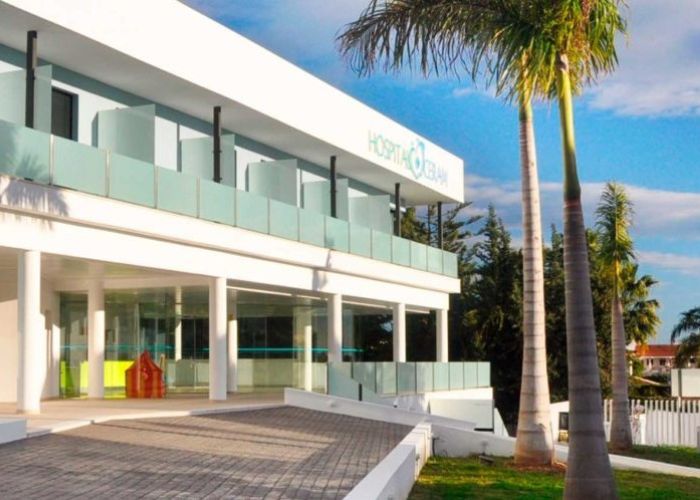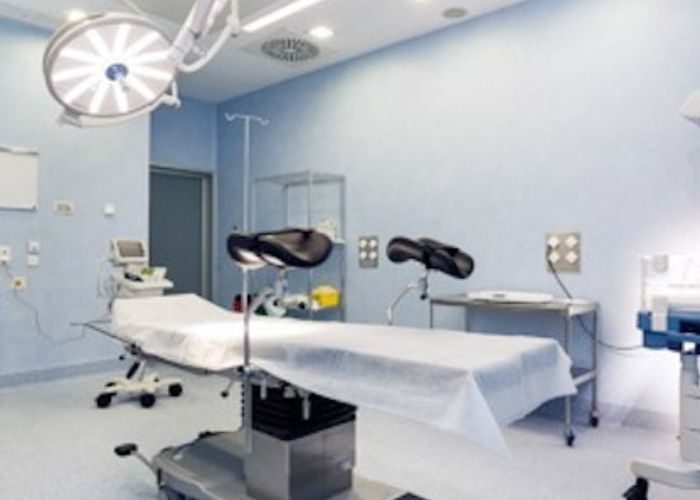MARBELLA – With the conviction that health care should be more personal, faster and better, Marc Verheyen and Peter van Aggelen founded Flexclinics in the Netherlands. Then, in order to also be able to help expats in southern Spain, they decided to open a branch in Marbella.
Marc Verheyen spoke about this with InSpain.nl. Since September last year, patients in Marbella can go for plannable, orthopaedic care to the English-speaking orthopedist Joris van der Lugt. Joris is a specialist in hip and knee surgery and performs all orthopaedic consultations and operations at the private clinic Hospital Ceram. People who live in southern Spain and need a new hip or knee, need to replace an existing prosthesis or have other orthopaedic complaints can contact him for an appointment.
Minimally invasive surgeries
Marc emphasises that hip operations are performed in a special way at Flexclinics Spain: minimally invasive. “This means that the muscles are affected as little as possible during the procedure. As a result, the patient experiences as few adverse effects as possible from the operation itself. The result? A much shorter rehabilitation time and a faster recovery, allowing patients to get back on their feet quickly. In the past, someone who had a hip replacement had to stay in bed for two weeks. Whereas, now you start physiotherapy on the day of the operation and you can go home the day after the operation”.
Flexclinics also strives for the smallest possible wound during knee operations. By working with a renowned centre for physiotherapy, fast and good rehabilitation can be guaranteed. This way, patients can count on the best possible care and fast, effective rehabilitation.
Hernia specialist
Marc is pleased that hernia specialist Edwin Diepeveen will soon also perform minimally invasive back operations in Spain. With these arthroscopic operations, a camera enters the body through a small incision, and using tools attached to the camera, the surgeon can make a stitch, remove something or even connect vertebrae. All this is done through the incision, as opposed to the traditional method of opening up the entire back.
“Thanks to this modern technique, many of these operations can now be performed as daycare. For extra comfort, an overnight stay can also be booked, therefore, a longer stay is not necessary. These are very nice, modern surgical techniques and we are very happy to be able to offer them. A hernia operation can be quite intense, but the way Edwin does it is fairly new. However, we also want to offer added value in Spain with this technique,” says Marc.
Hand, wrist and elbow surgeon
Another specialist who will often travel to Spain is hand, wrist and elbow surgeon Jantine Posthuma de Boer. Marc emphasises that Jantine is a specialised hand and wrist specialist with unique European training, which not many other specialists have followed. “Her arrival in Spain means that people who normally have to wait a long time – sometimes even a few years – for interventions in the area of the hands, wrists and elbows, can go directly to Flexclinics, which is a great advantage. This includes problems such as trigger fingers, carpal tunnel syndrome, Dupuyten’s disease, etc. “
Arthroscopy
According to Marc, arthroscopy is the biggest development in the medical world that has changed the way procedures are performed. More and more operations can now be performed as day treatments. Thanks to the arthroscopy, someone can now walk the same day of the operation and go home the next. But usually even the same day where they can continue to recover with the help of physiotherapy”.
In the past, even with a hernia, someone often had to lie in bed for a long time and then be mobilised again. However, Marc emphasises that lying still is almost always worse than mobilising after surgery. The consequences of not being mobile for a long time can be much more intense. Therefore, keeping the body mobile and moving is an important part of the healing process.
“At Flexclinics, we always look for the best treatment for the individual patient. And with arthroscopy as an important development in the medical world, it is now possible to perform procedures in a less invasive way and still offer the same quality of care,” says Marc.
Implants of high quality and long life
According to Marc, another thing that distinguishes Flexclinics is that they work with high-quality implants. “These implants last no less than 20 to 25 years, in contrast to implants from other manufacturers that only last 10 to 15 years. That’s a huge difference and has the advantage that patients do not have to undergo another operation until after 20 to 25 years instead of after 10 to 15 years”.
Marc explains that this is especially good news for people who need a prosthesis at a younger age. “By choosing these quality implants, they can enjoy a better quality of life for years to come, without having to worry about replacing their prosthesis”.
Flexclinics works ‘uncemented’
Flexclinics likes to do things in the best way for the patient. For example, orthopaedic surgeons work ‘uncemented’, they do not glue the implant into the bone. The big advantage of this is that the implant can still be replaced if ever necessary. This is not possible if a prosthesis is glued. Marc: “And that is good news for younger people who want to regain their mobility. In the past, they were often told to wait because they could only have one operation. But at FlexClinics this is no longer the case. Because in the end it is not about the operation, the equipment or whatever, but about the quality of life and the recovery of that quality”.
Preferably conservative trajectory
Marc is clear about Flexclinics’ approach: always conservative first and only operate if there really is no other option. “But there is a limit to what conservative treatments can achieve and sometimes surgery is simply the best option to get back on your feet. People who wait too long often take a lot of medicines and the side effects are not pleasant. It can even lead to negative effects on other organs in the body. It is even known that the long-term use of painkillers is associated with dementia symptoms”.
Remote health care
Thanks to the corona pandemic, Flexclinics has been able to accelerate its development in the field of remote care. And that offers a lot of advantages, according to Marc. He says that a lot has been invested in this, including video calling in a protected environment, so that medical data can be exchanged safely. We also work with a preventive, digital screening prior to surgery, so that patients have to visit the hospital less often and thus save time and effort.
But care at a distance also offers a solution in aftercare, says Marc. “For example, we can monitor a patient’s wound via a camera and possibly view it live if necessary. This not only gives the patient more convenience but also confidence, because the specialist also remains the point of contact during the aftercare process. Consequently, we get a lot of positive reactions to this. It sets us apart from other providers in this world. It also enables us to organise a first consultation within a day. Isn’t that fantastic? Partly remote care is the future and we are at the forefront of this development”.
Personal care with a smile
Customised care with a smile: it sounds like a utopia, but for Marc it is reality. It is not for nothing that he founded Flexclinics with the main aim of improving the healthcare sector. Because why should better care necessarily be more expensive? For Marc, personal attention is the key to success. “A smile costs nothing extra, I always say”.
That smile comes not only from the friendly staff, but also from the specialists who are given all the time and space to speak to their clients in detail. Because as Marc says: “If you take the time for a good conversation at the front, you win it at the back. Clients leave the door with peace of mind and have been able to ask all the questions they wanted. It is actually sad that personal attention and taking time for the client are still not self-evident in healthcare. But at Flexclinics it is the most normal thing in the world. Here people feel safe and heard, and that is what counts”.
Who can contact Flexclinics?
In Marbella in Hospital Ceram, Flexclinics, together with Joris van der Lugt, is currently mainly focusing on knee and hip surgery. With the arrival of new doctors, this range is further expanded. Joris also performs consultations at Cenyt Hospital in Estepona and now also operates patients insured there through Spanish insurers.
Flexclinics in Spain focuses mainly on expats and others who are insured in their home country or who are willing to pay for an operation themselves (or pay extra if the insurer only reimburses part) because they want to get rid of their pain as quickly as possible. “For operations in Spain, it depends on the health insurer and the policy conditions whether and to what extent the operation is reimbursed. We are happy to explore this together with the patient” explains Marc. For more information or to make an appointment click here.
Also read: Flexclinics, a private clinic for orthopaedic surgical procedures in Spain
(PARTNER CONTENT)



